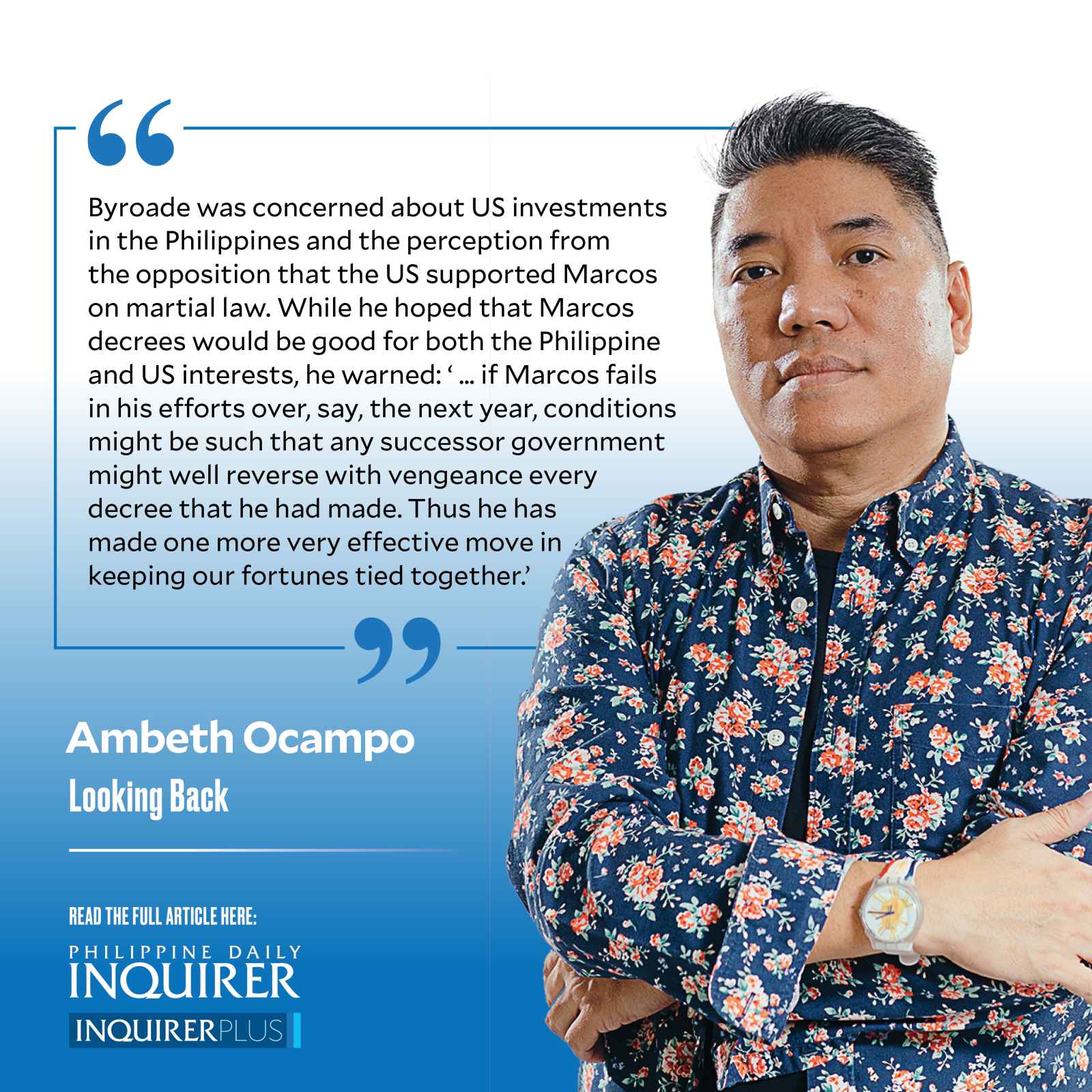US ambassador on martial law

Henry A. Byroade (1913-1993) was a US ambassador to the Philippines from Aug. 29, 1969 to May 25, 1973. He was an unusual diplomat, whose skill set was honed by a master’s degree in civil engineering from Cornell, brief deployment to China in World War II, rising to the rank of brigadier general before joining the state department. Byroade’s background must have struck a chord with Ferdinand Marcos Sr., who gave him privileged access to Malacañang that included invitations to join the president on cruises on the presidential yacht.
Byroade called on Marcos on Sept. 21, 1972 to find out if martial law would be declared within 48 hours as Ninoy Aquino had predicted. Prior to their meeting, Marcos and Imelda met a delegation of legislators and denied any plans for martial law, while in a back room, Juan Ponce Enrile, Francisco Tatad, and others were busy typing out the proclamation and accompanying orders. Part of Marcos’ diary entry for Sept. 21, 1972 reads:
“Amb. Byroade came to see me at 11:15 AM and was apparently interested to know whether there would be Martial Law. He seemed to favor it when I explained it is intended to primarily reform our society and eliminate the communist threat. But he suggested that a proclamation before the American elections may be used by [George] McGovern, the Democratic presidential candidate, as proof of the failure of the foreign policy of the present president.
“I told him I did not want it said that he was intervening in internal matters of the Philippine government. And that no decision has been arrived at but that I was under pressure and there seemed to be no other solution. He agreed that there seemed to be no other solution but he told Gov. [Benjamin] Romualdez later this day, when Kokoy went to see him, that his impression was that Martial Law would be proclaimed after the elections. How he came to arrive at this conclusion I can only guess. But this man cannot make logical deductions. I must be wary.
“He wanted Kokoy to go ahead and work in California for [Richard] Nixon. There are 200,000 Filipino votes and California is crucial. This morning I told him I was for:
“1. The government adopting the position on parity that the title of Americans over private land was final private parties but not to the government, so that Americans could dispose of their property.
“2. On the Lusteveco [Luzon Stevedoring Corp.] case, that Americans holding equity in corporations could become directors or executive managers only if the area of investment is highly technical and no qualified Filipinos are available.
“3. On the retail trade of sales of oil in bulk to industrial consumers, mandatory and clarificatory legislation is necessary.
“There seems to be a pipeline to Ninoy Aquino as he seems to know that the proclamation will be made this week end. We have to check this. It is dangerous. Even the Con[stitutional] Con[vention] is agog with the speculation.”
Filipino historians, writing on martial law half a century after, are fortunate to have not just Marcos’ version of events, but in this case, we have Byroade’s cable to the state department on Sept. 27, 1972 that opens with: “This man Marcos is a chess player, par excellence. It is usually possible to predict that he will choose as his next move one of two or three options that seem open to him—yet we cannot be certain just which one of these the next sealed envelope will contain.” Byroade was concerned about US investments in the Philippines and the perception from the opposition that the US supported Marcos on martial law. While he hoped that Marcos decrees would be good for both the Philippine and US interests, he warned: “But in doing it in this way, if Marcos fails in his efforts over, say, the next year, conditions might be such that any successor government might well reverse with vengeance every decree that he had made. Thus he has made one more very effective move in keeping our fortunes tied together.”
Fifty years on, we should look back not just on Marcos but other actors, as well as the political, social, and economic conditions that made him and martial law possible. While many US state department files on the Philippines have been declassified, there is a lot more awaiting historians in Washington.
—————-
Comments are welcome at aocampo@ateneo.edu




















